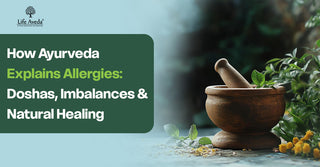Ayurvedic Diet to Prevent Allergies—What to Eat and Avoid
Allergies can be perceived as an external issue, caused by pollen, dust, or particular foods, but Ayurveda does not see it this way. As per this ancient wisdom, the internal environment of our body determines how we react to outside allergens. Rather than simply thinking about antihistamines and fast solutions, Ayurveda focuses on diet, the most powerful and natural weapon against allergies. An artfully designed Ayurvedic diet not only enhances your immune system but also brings harmony to the internal energies of your body, suppressing allergic responses at the very core. In this blog, we will discuss an Ayurvedic diet to prevent allergies and help you breathe with ease, itch less, and live well. Along with this, the details about the best Ayurvedic medicine for allergy relief will be provided.
When Allergies Take Over: A Story We All Relate To
Spring is supposed to be all about blooming flowers and clean air, yet for so many, it's a season of non-stop sneezing, runny noses, and scratchy skin. Many people experience flare-ups of allergies from eating specific foods, going outside when there's a change in the season, or even trying new skin products. It's frustrating and often complicates day-to-day life. Although allopathic medicine provides relief from allergies, it does not work on the triggers that cause them. On the other hand, Ayurveda does not only offer symptom relief but also a more profound, body-balancing system based on food and natural herbs.
The Ayurvedic Perspective: Why Allergies Happen in the First Place
Ayurveda sees allergies as the imbalance of three doshas—Vata, Pitta, and Kapha, which control our physical and emotional body functions.
- The imbalanced Kapha leads to congestion, excessive mucus, and respiratory allergies.
- Pitta imbalance can lead to the manifestation of skin allergies, itching, and inflammation.
- Vata imbalance can make your skin dry and scaly, and you can experience inflammation.
Aside from this, ama or toxic accumulation, which is caused by faulty digestion and slow metabolism, is the key trigger of allergies. With a weak digestive fire (agni), these toxins build up and destroy immunity and bring about hypersensitivity to innocent environmental stimuli.
In short, allergies don't "just happen"—they're symptoms that the body needs detoxification, balance, and nourishment. And that’s exactly what an Ayurvedic diet aims to offer.
How Food Shapes Your Immune Response
Your gut and immune system are closely connected. In Ayurveda, the gut (or digestive tract) is considered the primary gateway to overall health, including allergy resistance.
A healthy digestive fire guarantees:
- Adequate absorption of nutrients
- Removal of ama
- Increased ojas production, the sap of immunity and vitality
Some foods calm inflammation, open the respiratory tracts, and pacify the skin, while others encourage heaviness, congestion, and toxin buildup. So, the secret to allergy prevention is not only the avoidance of allergens but also the feeding of your immune system with proper foods.
Ayurvedic Diet Plan to Prevent Allergies
Ayurveda considers food to be more than just a source of nourishment; it is medicine. Allergies, seasonal or chronic, tend to result from digestive fire imbalance and toxic accumulation. A well-planned Ayurvedic diet helps reduce inflammation. improve gut health and keep your immune system resilient against allergens. Let’s explore the Ayurvedic diet to support allergy prevention and long-term health.
Daily Meal Routine with Food Options
-
Morning Ritual (6:30 – 8:00 AM)
Start your day with warm water infused with
-
- A slice of fresh ginger
- A squeeze of lemon
- A pinch of turmeric
This simple detox tonic flushes out toxins and ignites the digestive fire (Agni). If you’re prone to respiratory allergies, adding a few tulsi leaves can help clear congestion.
-
Breakfast Ideas (7:30 – 9:00 AM)
- Choose light, warm, and nourishing meals.
- Steamed apples or pears with cinnamon and ghee (excellent for calming aggravated Vata and Pitta)
- Moong dal chilla (mung bean pancakes) with coriander chutney
- Vegetable poha (flattened rice) with curry leaves and mustard seeds
- Oats or ragi porridge with jaggery, cardamom, and almond milk
- Avoid cold milk, smoothies, or cold cereals, as they aggravate Kapha and weaken digestion.
-
Mid-Morning (10:30 – 11:30 AM)
If you feel hungry:
-
- Have soaked almonds (4-5) or soaked raisins
- A glass of fresh coconut water or cucumber juice (in warmer months)
- This supports hydration and calms inflammation without burdening digestion.
-
Lunch (12:00 – 2:00 PM)
- Your heaviest and most nourishing meal of the day. Focus on:
- Moong dal khichdi cooked with turmeric, ghee, and digestive spices
-
Cooked seasonal vegetables:
- Ridge gourd, bottle gourd, pumpkin, ash gourd, spinach, or carrots
-
Whole grains or millets:
- Rice, kodo millet, or barnyard millet
-
Simple salad:
- Grated beetroot, cucumber, and carrot with lemon and rock salt
- Digestive buttermilk with roasted cumin and mint.
- Always eat fresh, warm food and avoid mixing too many food items in one meal.
-
Evening Snack (4:00 – 5:30 PM)
- Light snack to keep you energized:
- Roasted makhana (fox nuts) with ghee and turmeric
- A few dates or figs (if not Pitta aggravated)
- Herbal tea like Tulsi-Ginger or CCF tea (Cumin-Coriander-Fennel)
- Avoid coffee, packaged snacks, or anything fried.
-
Dinner (7:00 – 8:00 PM)
- Keep it light and easy to digest:
- Vegetable soup made with ash gourd, carrots, and garlic
- Moong dal or toor dal soup with black pepper and cumin
- A small portion of khichdi or sautéed vegetables with ghee
- Eating heavy or oily meals at night can increase toxin formation and disturb sleep.
-
Before Bed (9:30 PM)
- If needed, take a small cup of warm golden milk.
- Boil 1/2 tsp turmeric with 1 cup almond milk or lactose-free milk
- Add a pinch of black pepper and a drop of ghee
- This helps reduce inflammation, calms the nerves, and improves immunity.
Foods to Eat for Allergy Prevention
Ayurveda recommends foods that are fresh, seasonal, warm, and easy to digest. Here are some options that reduce inflammation and allergic reactions:

- Moong dal, toor dal, masoor dal (well-cooked)
- Steamed and cooked vegetables: bottle gourd, pumpkin, ridge gourd, ash gourd, spinach, carrots
- Whole grains and light millets: Rice, barley, kodo millet, barnyard millet
- Fruits: Apple, papaya, pomegranate, pears, ripe bananas (in moderation)
- Spices: Turmeric, ginger, cumin, coriander, fennel, black pepper
- Healthy fats: Ghee (clarified butter) for digestion and immunity
- Natural sweeteners: Jaggery, dates (in moderation)
Foods to Avoid During Allergies
These foods can increase toxin formation, aggravate doshas, and weaken your immune defense:
- Cold, refrigerated, or stale foods
- Dairy products, especially curd, cheese, and cold milk
- Fried or oily foods like chips, pakoras, and samosas
- Packaged and processed items: biscuits, chips, ready meals
- Nightshades, including tomatoes, brinjal (eggplant), and bell peppers, can trigger skin and respiratory allergies
- Excessive sugar, soft drinks, and cold beverages
- Incompatible combinations: Milk with fruits, fish with milk, honey heated in tea or food
Healing Herbs, Teas & Natural Remedies for Allergy Relief
Once your diet is under control, add Ayurvedic herbs and teas that work as natural antihistamines, immune boosters, and detoxifiers.

- Turmeric (Haridra): Rich in curcumin, turmeric reduces inflammation, purifies blood, and acts as a natural antihistamine. Add to warm milk or water; use in cooking daily.
- Tulsi (Holy Basil): Known to support respiratory health, fight infections, and strengthen immunity. Add fresh leaves in tea or decoction; Tulsi-Ginger tea is excellent during allergy season.
- Ginger (Adrak): Boosts digestion and clears toxins. Also beneficial in respiratory allergies. You can use ginger tea, ginger powder in food, or ginger juice with honey.
- CCF Tea (Cumin-Coriander-Fennel): Balances digestion and reduces inflammation. It’s a gentle detoxifier. Boil ½ tsp each of cumin, coriander, and fennel seeds in 2 cups of water. Sip warm water throughout the day.
- Neem: Known for its purifying properties, neem is helpful for skin allergies. You can take neem powder in capsules or with water on an empty stomach (under guidance).
- Amla (Indian Gooseberry): A powerhouse of Vitamin C, Amla improves immunity and digestion. You can consume amla juice in the morning or as dried powder with honey.
By following this diet and integrating these healing herbs and teas into your daily life, you can create a powerful natural defense against allergies without side effects. Ayurveda emphasizes prevention through lifestyle and diet, and this plan offers a sustainable path to clearer skin, better breathing, and overall health.
Best Ayurvedic Medicine for Allergy Relief—Life Aveda’s Holistic Approach
While an Ayurvedic diet is essential to prevent allergies, seasonal or persistent outbreaks usually need additional support. Life Aveda's Aller GI Capsules offer a holistic, herbal remedy based on ancient Ayurvedic knowledge and up-to-date science. This effective mixture includes potent herbs, including neem, shirish, ashwagandha, and haridra. These herbs are known to alleviate sneezing, nasal discharge, and skin irritation and promote overall immune function. Clinically tested and devoid of toxic additives, Aller GI doesn't merely suppress symptoms—it restores internal balance for long-term relief.
Conclusion
From an Ayurvedic point of view, allergies are not a nuisance—they're a message from your body demanding greater harmony with nature, healthier digestion, and emotional equilibrium. By adopting an Ayurvedic diet that balances your doshas, avoiding food and lifestyle culprits, and incorporating powerful herbal supplements like allergy capsules, you can build resistance to allergens for life.
It's time to reclaim your well-being. Begin eating mindfully, attune your lifestyle to your body's natural cycles, and welcome Ayurveda to restore inner balance. Ready to breathe easier, think clearly, and live better—naturally?
Discover Life Aveda's Aller GI Capsules today and start your path to allergy-free living, the Ayurvedic way.


